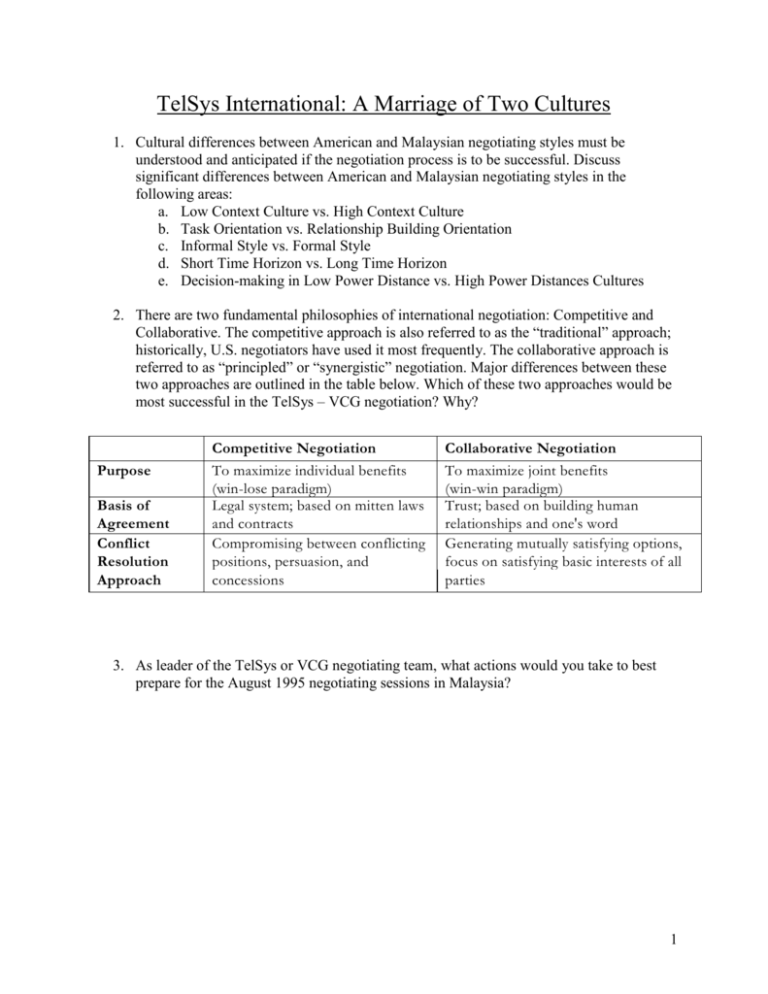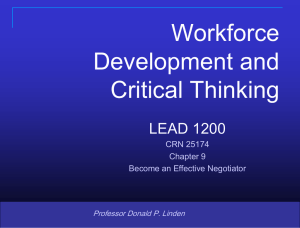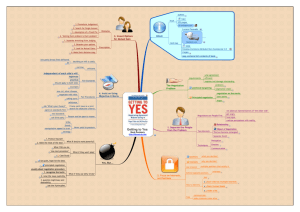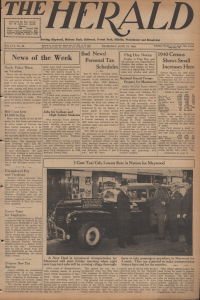TelSys International: A Marriage of Two Cultures
advertisement

TelSys International: A Marriage of Two Cultures 1. Cultural differences between American and Malaysian negotiating styles must be understood and anticipated if the negotiation process is to be successful. Discuss significant differences between American and Malaysian negotiating styles in the following areas: a. Low Context Culture vs. High Context Culture b. Task Orientation vs. Relationship Building Orientation c. Informal Style vs. Formal Style d. Short Time Horizon vs. Long Time Horizon e. Decision-making in Low Power Distance vs. High Power Distances Cultures 2. There are two fundamental philosophies of international negotiation: Competitive and Collaborative. The competitive approach is also referred to as the “traditional” approach; historically, U.S. negotiators have used it most frequently. The collaborative approach is referred to as “principled” or “synergistic” negotiation. Major differences between these two approaches are outlined in the table below. Which of these two approaches would be most successful in the TelSys – VCG negotiation? Why? Purpose Basis of Agreement Conflict Resolution Approach Competitive Negotiation To maximize individual benefits (win-lose paradigm) Legal system; based on mitten laws and contracts Compromising between conflicting positions, persuasion, and concessions Collaborative Negotiation To maximize joint benefits (win-win paradigm) Trust; based on building human relationships and one's word Generating mutually satisfying options, focus on satisfying basic interests of all parties 3. As leader of the TelSys or VCG negotiating team, what actions would you take to best prepare for the August 1995 negotiating sessions in Malaysia? 1 Footwear International 1. What role or roles does local politics play in the Footwear case? What are the positions taken by the principle local political groups? 2. What issues are of greatest concern to Footwear? 3. What actions can Footwear’s management team take in the near term to resolve this potential crisis? Treating AIDS: A Global Ethical Dilemma Answer Case Questions # 1, 2, 3, & 5 Moto: Coming to America Answer Case Questions #1, 2, 3, & 4 2 Guanxi in Jeopardy 1. What are the main characteristics of Chinese culture? How do they differ with those of Americans? How does this relate to the negotiation process? 2. What are the criteria that should be used in selecting a JV partner? Have they been met in this situation? Why or why not? 3. Evaluate the makeup of Electrowide’s team? Did they make appropriate choices for this negotiation? Why or why not? 4. Should Barb Morgan have been on the negotiating team? Why or why not? West Indies Yacht Club Resort 1. If you were Dowd, what short-term and long-term recommendations would you make to Johnson? 2. BVI employees, especially those in the Water Sports Department, don’t seem to be motivated by tips. Why do you think this is so? What alternative arrangements might be made? 3. Does the fact that Kimball, Johnson, and Fitch work from the United States have any potential impact on local employees? 4. Things are not all bad at the West Indies Yacht Club Resort. Who are the expatriate managers who seem to be effective and why are they effective? 3 South African Breweries Group 1. In this case, there are several human resource issues that are not usually discussed in business schools. Your task is to identify four of these issues, and discuss the importance of dealing with these issues. Maywood Inc. 1. What cultural differences exist between Singapore and the United States have affected Maywood’s operation of the new Asia Pacific regional headquarters? 2. What organizational issues have surfaced with Maywood’s operations in Singapore? 3. What local or regional Human Resource Management problems has Maywood Inc. faced in Singapore? 4









